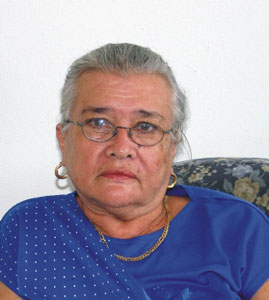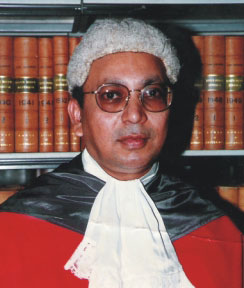

Yet, in the same building that day and in the same court room, lawyers for the Seychelles National Party (SNP) had been challenging the Government on its decision to deny a political party the right to obtain a radio broadcasting licence. SBC conveniently or had been ordered to ignore this very important legal challenge to The Telecommunication and Broadcasting Act. This Act provides for an SCR 800,000 licence fees to operate a radio station in Seychelles. These fees are considered relatively exorbitant by any standard and arguably amounts to a violation of the right to freedom of expression.
According to SBC, the case its reporter went to cover concerned an appeal by a litigant, Mrs Germaine Amesbury, against an earlier court ruling. What SBC failed to tell its viewers and listeners, however, was why, if the case was just an appeal against a judge’s decision, did the Chief Justice –whose decision is being challenged- need a lawyer to defend him? In fact, the Chief Justice had two lawyers – a fact gratuitously omitted by SBC in its report to the Seychellois public.
Last week SBC reported that the Chief Justice had retained a lawyer in order to start legal proceedings against REGAR, a newspaper associated with the Seychelles National Party (SNP), which had claimed that the Chief Justice had tendered his resignation to President James Michel to take effect early in 2007. SBC, again in prime time, said that the Chief Justice had denied the story and taken liberty for good measure, to inform its viewers and listeners of the eminent jurist’s intention to take legal action against the newspaper. It appears, after this week, that the Chief Justice has unfettered access to the state funded broadcasting media to report his personal opinions and intended actions.
The court proceedings which SBC misreported on this week was a sitting of the Constitutional Court to determine whether, by his action and subsequent decision, the Chief Justice had deprived Mrs. Germaine Amesbury of her fundamental human right to a fair and public hearing in a court established by law. The Constitutional Court is in fact a sitting of the Supreme Court to determine a constitutional question. According to the Constitution a minimum of two Supreme Court Judges are required to hear any constitutional issues.
In this case three of the Chief Justice’s peers are sitting in judgement on his action, one of whom had, in an earlier ruling, appointed Mrs Germaine Amesbury as the executrix of the estate of her grandfather – one Pierre Ernest Vidot. Upon her appointment by the Supreme Court, Mrs Amesbury then went on to sue a company, Golden Sun Property (Pty) Ltd, for the recovery of land she alleges belongs to the estate. One of the directors of Golden Sun Property (Pty) Ltd is lawyer and notary Mr Gerard Maurel.
But while Mrs Amesbury was patiently waiting for her case to wind its way slowly through the courts, before another judge, (now sitting on the constitutional court case), the Chief Justice, “secretly” entertained a motion by the other side to have her removed as the executrix of the estate of her late grand father. The order by the Chief Justice is incredulous in that Mrs Amesbury was not given an opportunity to be heard. The order was made in the Chambers of the Chief Justice on the application of Mr. Gerard Maurel without Mrs. Amesbury being informed. The application made by Mr. Maurel was heard ex-parte thus denying Mrs Amesbury her constitutional right to a fair hearing. An ex-parte hearing is a legal jargon to describe a court proceeding when only one party is heard. Mrs Amesbury claims she was never informed of such a proceeding and only found out about it, when she was given a copy of the order revoking her executorship.
This is the second challenge that Mrs Amesbury has brought against the Chief Justice. In October, Mrs Amesbury asked the Constitutional Appointment’s Authority (CAA) to have the Chief Justice investigated with a view to his eventual impeachment – in other words for him to be removed as a judge. This is allowed under the Constitution. The Constitution authorises the CAA to set up a tribunal to investigate any allegation of misconduct without pre-judging the merits or otherwise of the case. So far no tribunal has been set up as the CAA is of the view that Mrs. Amesbury has alternative remedies.
This week, lawyers for the Chief Justice, Mrs Amesbury, and the Attorney General appeared before the Constitutional Court to argue the merit of Mrs Amesbury’s claim that she had been deprived of her fundamental right to a fair and public hearing. As a result of SBC’s erroneous reporting of the case it has become not only one of national interest but one which has aroused international concerns. Legal experts have opined that this case has serious legal implications and, if successful, will close the floodgates against the making of indiscriminate ex-parte orders in chambers which can operate in such a way as to deny the other party its constitutional right to be heard.
The Constitutional Court proceeding places the judiciary in a constitutional dilemma. It also has the potential to create a judicial crisis in that the Court has to decide whether to uphold Mrs. Amesbury’s right to a fair hearing or to pronounce on the propriety of the action of the Chief Justice in the full glare of national and international publicity. But the Chief Justice will not be alone in that spotlight. Mrs Amesbury intends to pursue the matter not only through the highest court in the land but also as far as the Human Rights Committee in Geneva. Should that happen, it will throw the entire justice system of the Seychelles into the international spotlight too.
The Judges sitting in judgement of the Chief Justice have been appointed in controversy regarding their eligibility for the post. At least two of them have served as Supreme Court judges as foreigners. Both were given citizenship by presidential discretion even though as foreigners they were not constitutionally entitled to renew their contracts.
Contrary to the impression SBC is trying to portray, it is not the Chief Justice – his integrity, honesty and competence– which are on trial, but the Seychellois Constitution. By courting publicity from the state controlled and funded broadcasting media, he may find that he had bitten more than he can chew.


Chief Justice Alleear before his peers
THE SEYCHELLES CONSTITUTION ON TRIAL
The state funded Seychelles Broadcasting Corporation (SBC) went to cover a case before the Constitutional Court this week which has apparently captured the imagination of the Seychellois public. The case is considered by SBC to be one which is in the “national interest.” The same evening, in its prime news in Creole on both the television and radio it proceeded to mislead the public about the nature of the case it had covered.